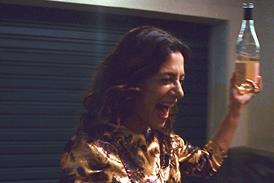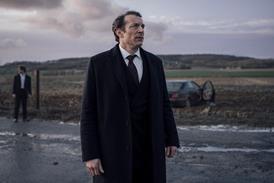In a year when big-name Hollywood talent has plunged headlong into films about war, terrorism and politics, Charlie Wilson's War is both refreshing and disappointing. Refreshing, because it tells its story with such brisk narrative skill and wit. Disappointing, because it assiduously avoids taking its subject matter into the more ambiguous territory which might risk alienating a wide moviegoing audience.
Industry-gazers who thought it was the film to beat at the Academy Awards - a so-called 'important' film - will be surprised. Directed by Mike Nichols, written by Aaron Sorkin and starring Tom Hanks and Julia Roberts, Charlie Wilson's War is principally a pleasant comedy. Like other films in the Nichols cannon, Primary Colours and Working Girl for example, it is broad and unsatirical, taking jabs at its protagonists but too polite by far.
Originally penned in for a Christmas day release, Charlie Wilson's War will now be released in 21st December in North America.
The achievement of Nichols, Sorkin and their star and producer Hanks is to deliver a film about politics, a true story no less, that could make some serious money, at least at the domestic box office. It will score more on the level of Dave or An American President than flops like Primary Colours or All The King's Men. Certainly after the failure of star-heavy films like In The Valley Of Elah , Rendition and Lions For Lambs, it is destined to be the feelgood political hit of 2007.
International audiences are likely to feel confused by a story which is only subtly ironic in its portrayal of US interference in international affairs. Its somewhat exuberant depiction of Washington DC double-dealing and its dubious foreign policy is hardly likely to win over sceptical foreigners, even with such big stars on board.
Based on the book by George Crile, Charlie Wilson's War is the remarkable story of Wilson, the hard-drinking, womanising Texas congressman (played by Hanks) whose deep feelings of patriotism and anti-communism led him to spearhead the covert US government involvement in the support, arming and training of ill-equipped Afghani forces against the Soviet invasion of Afghanistan throughout the 80s.
The film opens as Wilson is invited to invest in a TV series (' Dallas in Washington ') while sitting in a hot-tub in Las Vegas surrounded by hookers snorting cocaine.
But Wilson, we soon witness, is not just a hedonist and layabout but a man passionate about the US cause in the face of the Soviet threat who sits on the influential Defence Appropriations Subcommittee which controlled funding for covert operations in places like Afghanistan. When his virulently anti-Red ex-lover, Texas multi-millionairess Joanne Herring (Roberts) suggests he goes to Pakistan to meet with President Zia (Om Puri), witness the mayhem first hand and bring his influence to bear on government funding to arm the Mujahideen, he single-handedly works to increase the budget for the covert war from $5m to $1bn.
Assisting him is unconventional CIA agent Gust Avrakotos (a wonderfully gruff performance by Hoffman), a working class man of no social skills but extreme intelligence, who helps Wilson mobilise a joint nation task force involving bizarrely Israel as well as Pakistan and Saudi Arabia to amass untraceable weapons and smuggle them into Afghanistan.
The tone here is comedic from the start. This is Nichols at his most playful and Sorkin at his most comfortable, drawing affectionate portraits of Washington politicos while never aspiring to the detached satire of The Candidate or Bulworth.
Wilson, for example, as played by Hanks, is half-buffoon, half-patriot, and never less than likeable, even though he keeps a Hefner-esque staff of busty office girls, asks for a whisky while on an official visit to Pakistan and casually beds the daughter (Blunt) of a loyal constituent. The film refuses to paint Wilson as anything other than a flawed, naïve man doing what he thought was right at the time.
What's missing is the bigger picture. The chillingly ironic longterm ramifications of Wilson's patriotism - his programmes essentially formed the backbone for today's Al Qaeda - are only hinted at as the film draws to a close. Indeed, you wish Nichols had been less warm to his character here: while a 97-minute running time is welcome in an awards season full of bloated prestige titles, this is one story which could have used more detail, context and, yes, perhaps even gravitas.
Production companies
Playtone (US)
Relativity Media (US)
Participant Productions (US)
Worldwide distribution
Universal Pictures
Executive producers
Celia Costas
Ryan Kavanaugh
Jeff Skoll
Producers
Tom Hanks
Gary Goetzman
Screenplay
Aaron Sorkin
Based on the book by George Crile
Director of photography
Stephen Goldblatt
Production designer
Victor Kempster
Editor
John Bloom
Antonia Van Drimmelen
Music
James Newton Howard
Main cast
Tom Hanks
Julia Roberts
Philip Seymour Hoffman
Amy Adams
Ned Beatty
Emily Blunt
Om Puri
Ken Stott






















No comments yet